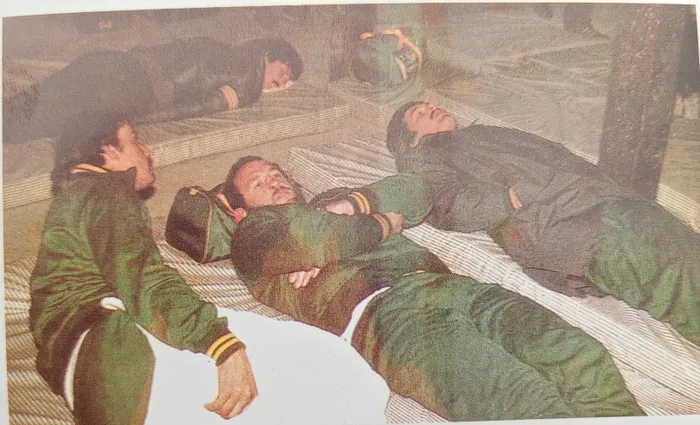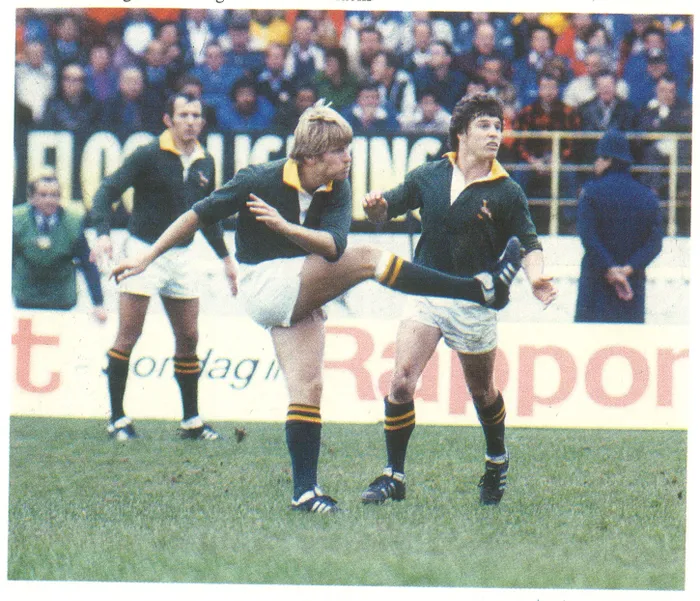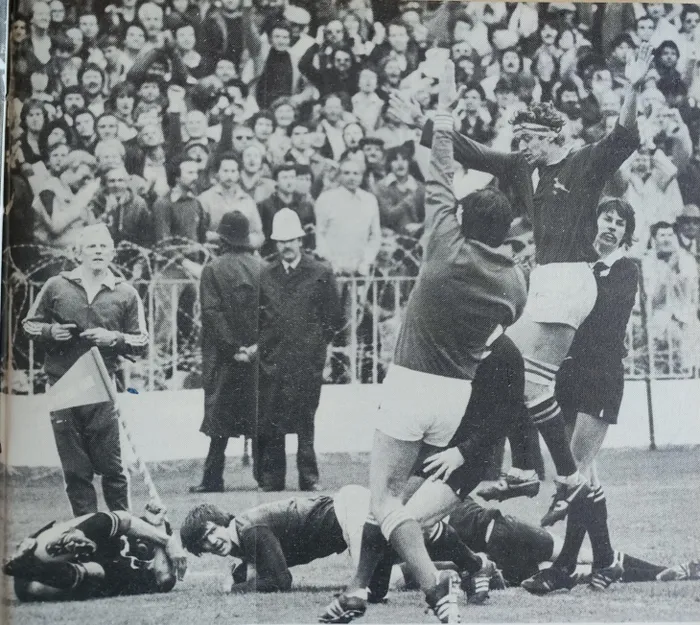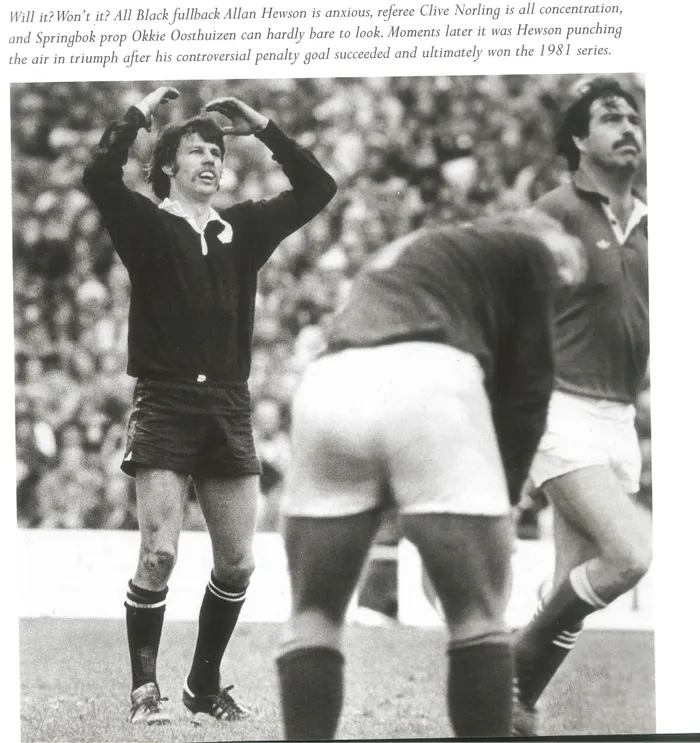Memories of the 1981 Springboks' tour of New Zealand: When Test rugby met protests
Rub of the Green

The 1981 Springboks slept in the Eden Park change rooms before playing the All Blacks to avoid anti-tour demonstrators.
Image: Supplied
If you talk to South Africans who were of rugby-viewing age in 1981 about the Springbok tour of New Zealand, they will recollect cradling cups of coffee in front of televisions at a chilly 4.30am, the surreal sight of a small plane dropping flour bombs on Eden Park, and, chiefly, of wanting to inflict grievous bodily harm on Clive Norling.
In 1980s South Africa, JR Ewing of Dallas infamy had nothing on the Welsh referee who contrived the ending to the series-deciding third Test between the Boks and the All Blacks when a 22-22 draw — the score well into injury time — could not have been more fairly scripted.
It had been 57 days of turmoil for New Zealand over whether the tour should have taken place, while the Springboks had braved an unsettling environment that would make the modern professional implode. A drawn series was a result beamed down from rugby heaven, but showman Norling disagreed and ruled a series of dodgy penalties against the Boks to put kicker Allan Hewson into goal-kicking range.
This was the pre-internet world, and news was gathered from the radio, television and newspapers.In the eight weeks the Boks were in New Zealand, the tour was the lead news story every day bar one — the royal wedding between Diana and Charles on 29 July 1981.
There were New Zealanders who supported the tour because it was felt that sporting relations between the multiracial Kiwi teams and the Springboks could change attitudes in South Africa, while others felt apartheid South Africa should be banished, full stop.
On the rugby pitch, the Boks played good rugby, and Naas Botha became the second-biggest topic in the local news. Naas was on fire and by the end of the tour had scored a staggering 129 points.

Springbok flyhalf Naas Botha was the talk of New Zealand in 1981 because of his accurate goalkicking.
Image: Supplied
The Boks did not lose a game in their 11 matches against the Kiwi provinces, and New Zealanders billed them as favourites for the first Test in Christchurch.
The Boks would lose 14-9 and it is a measure of their grit that they came so close after the most uncomfortable build-up.
The night before the Test, the non-Test players were farmed out to private homes, and the Test players were smuggled into a local rugby club where they were given camp beds in a squash court.
To thwart the protesters, the team left for Lancaster Park at dawn where they saw the pitch for the first time (there could be no captain’s practice on the eve of the game). Mattresses were strewn on the change-room floor for them to rest on and there was a pool table to help alleviate the boredom.
Outside the ground, police were fighting off 6,000 protesters. By kick-off, the Boks were mentally and physically drained.
From the early days of the tour, the anti-tour organisers had threatened to kidnap a Springbok, and for that reason they had their own elite police guard called the Red Squad.
The Springboks had to win the second Test at Athletic Park in Wellington to keep the three-Test series alive. To stay one step ahead of the demonstrators, the Boks went to the stadium the night before the game and slept in the change room.

Rob Louw is jubilant as Ray Mordt scores one of his three tries against the All Blacks at Eden Park.
Image: Supplied
I went to Athletic Park before it was knocked down in 1998 to make way for a new stadium in Wellington. Trust me — the dilapidated change rooms were rudimentary at best.
Imagine modern players having to sleep in the dressing room before a Test match.A consolation was that the Boks could sleep in and not have to dodge protesters on the way to the ground.
They won the game handsomely. It is funny how history repeats itself. On the 1937 Bok tour of New Zealand, the selectors erred in not picking their tour captain, Philip Nel, before the first Test in Christchurch. They restored him for the second Test in Wellington, and the Boks won.
In 1981, the selectors did not pick Wynand Claassen for the first Test in Christchurch but did for the second, in Wellington — and the Boks won.
The match before the third Test was against the New Zealand Maoris. The Boks were down 12-9 as full-time approached when flyhalf Colin Beck dropped for goal. As biased as I was at 14 years of age, I saw the kick go wide of the posts. I remember the puzzled look on the face of the ref. In the end, he gave it to the Boks, but you could tell he had no idea.
That game had a wonderful sequel. The Maori captain that day was Billy Bush, a veteran of the 1976 tour of South Africa. He was invited to the 25th anniversary of the tour in Pretoria in 2006, and captain Claassen presented Bush with a Springbok head.

All Black fullback Alan Hewson nervously watched his injury-time penalty sailing towards the uprights. The kick went over and the Kiwis won the deciding Test at Eden Park 25-22.
Image: Supplied
With tears in his eyes, the grateful Bush smiled and said:“We always knew we had beaten the Springboks 12-12!”
And so to the third Test at Eden Park on 12 September 1981. Could there have been a more bizarre game with a stranger climax?
To the backdrop of a plane repeatedly sweeping the field and dropping flour bombs — one of which concussed All Black prop Gary Knight — the game was fiercely exciting. The home team enjoyed a tidy 19-9 lead 12 minutes into the second half, only for Bok wing Ray Mordt to score a sensational hat-trick of tries.
The third of them levelled the scores at 22-22, and a Botha conversion from the touchline would have made it 24-22 to South Africa. Norling had indicated to Claassen that time was up as it was the 44th minute of the half.
But Botha’s golden boot deserted him, and Norling would play on... and on. Years later he said,“Nobody wanted a draw,”yet most people felt that after all the strife it would have been befitting if there were no winners or losers.
But Norling kept penalising the Boks for debatable “infringements” until Hewson kicked the All Blacks to victory — in the 49th minute.
New Zealanders rejoiced and the name Norling was added to the lexicon of South African profanity.
This article is an extract from Mike Greenaway's best-selling book The Fireside Springbok. He also penned Bok to Bok, the story of the Boks' 2023 World Cup success.
Related Topics: